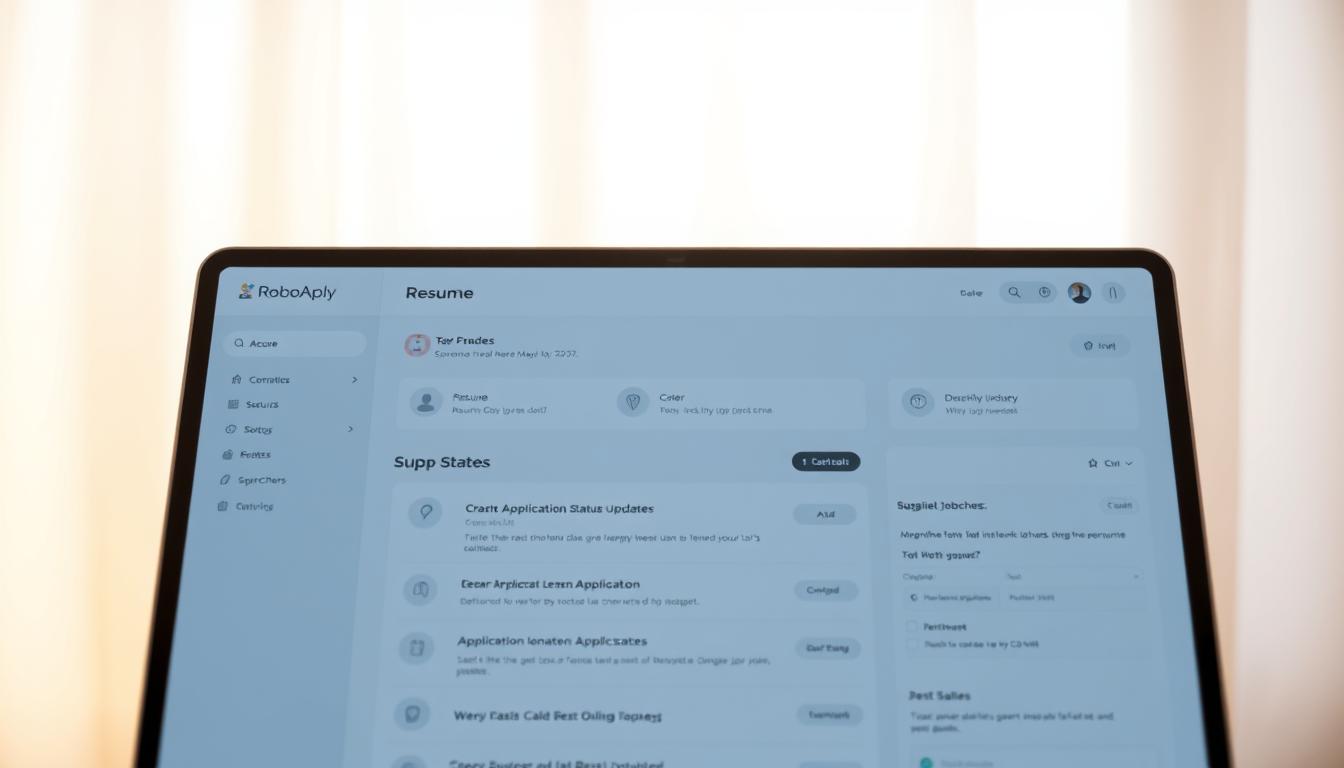So, you’re looking to land a Linux System Administrator job, huh? That’s a smart move, because these roles are super important in today’s tech world. But getting your resume just right can feel like a puzzle. You want to show off all your skills and experience without making it too long or boring. Don’t worry, we’ve got you covered. This guide will walk you through some real-world examples and give you solid tips to build a resume that gets noticed. We’ll help you make your Linux System Administrator Resume shine. Powered by RoboApply.
Key Takeaways
- Your resume needs to clearly show your technical abilities and past work in Linux system administration.
- Use specific examples to highlight your achievements, like how you improved systems or solved problems.
- Tailor your resume for each job you apply for, matching your skills to what the company is looking for.
1. Linux System Administrator

So, you’re aiming for a Linux System Administrator role? Awesome! It’s all about showing you can handle the nitty-gritty of server management, troubleshooting, and automation. Let’s break down how to make your resume shine.
Think of your resume as a highlight reel. It’s not just a list of what you’ve done, but a showcase of how well you’ve done it. For inspiration, check out some resume examples from seasoned pros.
A strong Linux System Administrator resume emphasizes practical skills and quantifiable achievements. It’s about demonstrating your ability to keep systems running smoothly and securely.
RoboApply can help you tailor your resume to specific job descriptions, ensuring you highlight the skills and experience that matter most to potential employers.
2. Systems Engineer
Systems Engineers take a broader view of IT infrastructure, focusing on the overall design, integration, and management of systems. They often work on complex projects that require a deep understanding of various technologies and how they interact. Let’s look at how to present your experience effectively.
Here’s a breakdown of what a Systems Engineer resume might look like:
- Name: Your Name
- Title: Systems Engineer
- Contact: City, Country • (123) 456-789 • [email protected] • linkedin.com/in/your-profile
EXPERIENCE
- Company: Resume Worded
- Role: Systems Engineer
- Dates: March 2018
- Moderated Red Hat Linux and CentOS services, underlining system efficiency by 30%
- Transitioned Linux servers to an optimized cloud platform, saving the company $150K annually.
- Executed security upgrades to Samba and NFS, bolstering data integrity by 70%.
- Company: Coached.com
- Role: Junior Systems Engineer
- Dates: August 2013 – January 2016
- Assured smooth MySQL database operations, escalating operational performance by 25%
- Administered FTP services, uplifting data transfer efficiency by 30%
- Spearheaded DNS configurations to improve system connectivity, increasing system stability by 20%
EDUCATION
- University: Resume Worded University
- Degree: Master of Science in Systems Engineering
- Date: May 2013
- Emphasis on Software Systems, Agile Methodologies, and Risk Management
- University: Resume Worded Institute
- Degree: Bachelor of Science in Computer Engineering
- Date: May 2011
- Concentrations: Network systems, Data structures and Algorithms
- Recipient of the University’s Technical Excellence Award
SKILLS
- Programming: C++, Java, Python, Ruby, Shell Scripting, JavaScript
- Operating Systems: Windows, Linux/Unix, MacOS, Red Hat Enterprise Linux
- Tools & Software: Ansible, Docker, VMware, Jenkins, AWS, Azure
- Networking & Security: Cisco IOS, Juniper JUNOS, Firewall, VPN, TCP/IP, Ethernet
OTHER
- Certifications: Certified Systems Engineering Professional (CSEP), Certified Cisco Network Professional (CCNP)
- Projects: Led the design and deployment of a secure VPN network for an MNC
- Professional Associations: Member, International Council on Systems Engineering (INCOSE)
- Awards: IBM Top Contributor Award, 2017
When crafting your Systems Engineer resume, quantify your achievements whenever possible. Use metrics to showcase the impact of your work, such as improved system performance, cost savings, or enhanced security. This helps employers understand the value you bring to the table.
Remember to tailor your resume to each specific job application. Highlight the skills and experiences that are most relevant to the position. RoboApply can help you identify the keywords and skills that employers are looking for, ensuring your resume stands out. For example, if the job description emphasizes cloud migrations, be sure to highlight your experience with cloud migrations.
3. IT Systems Administrator

An IT Systems Administrator is often the jack-of-all-trades in a company, handling everything from user support to server maintenance. Let’s look at how to showcase that versatility.
An IT Systems Administrator resume needs to show you can handle a wide range of tasks. RoboApply can help you tailor your resume to highlight the specific skills and experiences that match the job description, making sure you stand out to potential employers.
Example
Your Name
City, Country • (123) 456-789 • [email protected]
Summary
A highly motivated and skilled IT Systems Administrator with 5+ years of experience in managing and maintaining IT infrastructure. Proven ability to troubleshoot complex issues, implement effective solutions, and ensure system security and stability. Dedicated to providing excellent technical support and improving IT operations.
Experience
Senior IT Systems Administrator
ABC Company, City, Country
2020 – Present
- Managed and maintained over 100 servers, ensuring optimal performance and uptime.
- Implemented and managed VMware infrastructure, improving system reliability and scalability.
- Developed and maintained data backup and recovery procedures, safeguarding critical data.
- Provided technical support to end-users, resolving issues promptly and efficiently.
- Automated system administration tasks using scripting, reducing manual efforts by 40%.
IT Systems Administrator
XYZ Corporation, City, Country
2018 – 2020
- Administered Windows and Linux servers, ensuring system security and stability.
- Managed network infrastructure, including LAN/WAN, firewalls, and VPNs.
- Implemented and maintained Microsoft 365 environment, providing support to end-users.
- Troubleshooted hardware and software issues, resolving problems quickly and effectively.
Skills
- Operating Systems: Windows Server, Linux (Red Hat, CentOS, Ubuntu)
- Virtualization: VMware, Hyper-V
- Cloud Computing: AWS, Azure, Microsoft 365 Administration
- Networking: LAN/WAN, TCPIP, Cisco IOS, Firewalls, VPNs, DNS/DHCP
- Scripting: PowerShell, Bash
- Databases: SQL Server, MySQL
- Security: Firewalls, VPNs, Intrusion Detection Systems
Education
Bachelor of Science in Computer Science
University Name, City, Country
2014 – 2018
Certifications
- Certified Information Systems Security Professional (CISSP)
- Microsoft Certified: Azure Administrator Associate
Other
- Conferences & Trainings: Attended annual Microsoft Ignite Conference for five consecutive years, Completed advanced technical training in cloud infrastructure management
- Volunteering: Tech mentor at local high schools, promoting IT careers and providing hands-on training
- Leadership: Led team of junior system administrators at Coached.com, improving overall system efficiency by 25%
This example shows how to present a broad skillset while highlighting key achievements. Remember to tailor this to the specific requirements of the job you’re applying for.
Key Skills to Highlight
When crafting your IT Systems Administrator resume, make sure to emphasize these skills:
- Operating Systems: Proficiency in Windows and Linux environments is a must. Mention specific distributions like Red Hat, CentOS, or Ubuntu.
- Networking: Showcase your knowledge of LAN/WAN, TCP/IP, firewalls, and VPNs. Experience with Cisco IOS is a plus.
- Cloud Computing: Highlight experience with AWS, Azure, or Microsoft 365. Cloud skills are increasingly important in modern IT environments.
- Virtualization: Expertise in VMware or Hyper-V is highly valued. Describe your experience with managing virtualized environments.
- Security: Emphasize your understanding of security best practices, including firewalls, VPNs, and intrusion detection systems.
Quantifiable Achievements
Instead of just listing your responsibilities, quantify your achievements whenever possible. For example:
- "Reduced system failure detection by 35% by optimizing system monitoring using Nagios and Grafana."
- "Enhanced processing speed by 50% by leading the upgrade of outdated Linux servers."
- "Reduced manual efforts by 40% by innovating key automation practices via Shell scripting."
Certifications and Training
Include any relevant certifications, such as:
- Certified Information Systems Security Professional (CISSP)
- Microsoft Certified: Azure Administrator Associate
- Certified Systems Engineering Professional (CSEP)
- Certified Cisco Network Professional (CCNP)
Also, mention any conferences or training you’ve attended, such as the Microsoft Ignite Conference. These show your commitment to staying current with the latest technologies. You can also check out a system administrator resume guide for more information.
Tailoring Your Resume
Remember to tailor your resume to each job you apply for. Carefully review the job description and highlight the skills and experiences that match the requirements. Use keywords from the job description throughout your resume to help it get past applicant tracking systems (ATS). RoboApply can help you identify these keywords and optimize your resume accordingly. For example, if the job emphasizes backup solutions, make sure to detail your experience with backup solutions in your resume.
4. Summary

Your resume summary is like a movie trailer for your career. It needs to grab the reader’s attention and make them want to learn more. Think of it as your elevator pitch – a concise overview of your skills, experience, and what you bring to the table. It’s especially important if you’re trying to highlight specific achievements or make a career change. RoboApply can help you tailor your summary to match the job description, ensuring it hits all the right notes.
A strong summary can significantly increase your chances of getting an interview. It’s your first impression, so make it count. Tailor it to each job you apply for, highlighting the skills and experiences that are most relevant to the position. Don’t just list your skills; show how you’ve used them to achieve results.
Here’s what makes a good summary:
- Conciseness: Keep it short and sweet – aim for 3-4 sentences.
- Relevance: Focus on the skills and experiences that match the job description.
- Quantifiable Results: Whenever possible, include numbers to show the impact of your work.
A well-crafted summary is not just a list of your qualifications; it’s a compelling narrative that showcases your value to the employer. It should answer the question, "Why should they hire you?" in a clear and concise manner.
For example, instead of saying "Experienced in Linux administration," try something like "Highly skilled Linux system administrator with 5+ years of experience managing and maintaining critical systems, resulting in a 20% reduction in downtime."
Remember, your summary is your chance to shine. Make it memorable, make it relevant, and make it count. If you are looking for resume summary examples, there are plenty of resources available to help you craft the perfect one.
5. Experience

Your experience section is where you really show what you’ve done. It’s not just about listing jobs; it’s about showing how you’ve used your skills and made a difference. Think of it as your chance to prove you’re the right person for the job. RoboApply can help you tailor this section to match specific job descriptions, highlighting the most relevant experiences.
Here’s an example of how you might structure your experience section:
Linux System Administrator
IT Solutions Inc.
2012-2015
- Supported a large-scale Linux-based infrastructure serving 500+ users across multiple locations.
- Upgraded Linux servers from CentOS 6 to CentOS 7, resulting in improved performance and security.
- Managed LDAP directory services, including user authentication, access control, and SSL certificate management.
- Implemented log rotation and retention policies, complying with industry regulations and ensuring auditability.
Another example:
Linux Server Specialist
Acme Corp.
2015-Present
- Maintained and administered Linux servers, resolving Linux-related issues and ensuring smooth operations.
- Implemented monitoring tools such as Nagios to proactively identify and address system bottlenecks.
- Managed user accounts, permissions, and access control in compliance with company policies.
Focus on accomplishments, not just responsibilities. Use action verbs and quantify your achievements whenever possible. For example, instead of saying "Responsible for server maintenance," say "Reduced server downtime by 15% through proactive maintenance and monitoring."
When describing your experience, remember to:
- Tailor your descriptions to match the job requirements. Read the job description carefully and highlight the experiences that are most relevant.
- Use action verbs to start your bullet points. This makes your descriptions more dynamic and engaging.
- Quantify your achievements whenever possible. Numbers and metrics make your accomplishments more concrete and impressive.
It’s okay to have a longer resume if you have a lot of relevant experience, especially for senior roles. Just make sure everything you include is important and shows why you’re a great fit. You can find more information on crafting a strong systems administrator resume to help you with this section.
6. Education
Your education section is where you list your academic achievements. It’s pretty straightforward, but there are a few things to keep in mind, especially depending on how much experience you have. RoboApply can help you tailor this section to highlight the most relevant information for the jobs you’re applying for.
If you’re fresh out of school or don’t have a ton of work experience, you can add relevant coursework or projects to show off your skills. As you gain more experience, you’ll want to keep this section concise and focus on your work history.
- Degree Type (e.g., Bachelor of Science)
- Major (e.g., Computer Science)
- University Name
- Graduation Date (or Expected Graduation Date)
If you’ve been in the field for a while, keep your education section brief. Hiring managers will be more interested in your experience. Just list your degree, major, and university. No need to go into detail about coursework or projects.
Also, don’t forget to include any relevant certifications. Certifications like Red Hat Certified System Administrator (RHCSA) or CompTIA Linux+ can really boost your resume, showing that you have the skills and knowledge to do the job. List the certification name and the year you earned it. If it expires, include the expiration date or indicate that it’s active.
For example:
- Bachelor of Science in Computer Science, University of Example, 2015
- Master’s Degree in System Administration, University of Tech, 2017
- Red Hat Certified System Administrator (RHCSA), 2016
The education section should be clear and easy to read. Make sure to list your degrees in reverse chronological order, with the most recent one first. This helps hiring managers quickly see your qualifications. If you have multiple degrees, list them all, but keep the descriptions brief and to the point. Tailor the coursework and projects you include to match the job description and showcase your relevant skills. This makes your resume more appealing to potential employers. RoboApply can help you with this tailoring process, ensuring your resume highlights the most relevant information for each job application. If you’re applying for a junior system administrator position, make sure to highlight any relevant coursework or projects you completed during your studies.
7. Skills
It’s super important to showcase the right skills on your Linux System Administrator resume. This section is where you highlight what you’re good at, so make it count! Think about the specific requirements of the jobs you’re applying for and tailor your skills list accordingly. RoboApply can help you identify the most relevant skills based on job descriptions.
Here’s a breakdown of what to consider:
- Technical Skills: These are the hard skills that prove you know your way around Linux systems. Think operating systems, scripting languages, and cloud platforms.
- Soft Skills: Don’t underestimate these! Skills like communication, problem-solving, and teamwork are essential for any sysadmin.
- Tools and Technologies: List the specific tools and technologies you’re proficient in, such as configuration management tools or virtualization software.
It’s better to list fewer skills that you’re truly proficient in than to include a long list of skills you only have a basic understanding of. Quality over quantity!
To make sure you’re on the right track, consider using a tool like RoboApply to analyze your resume and see if you’ve included the skills that hiring managers are looking for. It can really help you fine-tune your resume and increase your chances of getting an interview. For example, you can use it to check if you have the essential skills for system administrators.
Here’s a sample skills section:
Skills:
* Operating Systems: Red Hat Enterprise Linux, Ubuntu, CentOS
* Scripting: Bash, Python, Perl
* Cloud: AWS, Azure, GCP
* Configuration Management: Ansible, Puppet, Chef
* Virtualization: VMware, Docker, Kubernetes
* Networking: TCP/IP, DNS, DHCP
* Security: Firewalls, Intrusion Detection Systems
Remember to keep your skills section up-to-date and relevant to the jobs you’re applying for. Good luck!
8. Linux System Administrator Resume Tips
As someone who’s been in the trenches of hiring Linux System Administrators, I’ve seen a lot of resumes. The ones that really grab your attention are those that clearly show off the candidate’s tech skills, their experience, and the impact they’ve made. So, here are a few tips to help your resume stand out. RoboApply can help you implement these tips effectively.
It’s important to tailor your resume to the specific job you’re applying for.
- Analyze the Job Posting: Really dig into what the job description is asking for. What skills are they highlighting? What experience do they seem to value most? Use that as your guide.
- Show, Don’t Just Tell: Instead of just listing skills, give examples of how you’ve used them. Did you automate a process that saved the company time? Did you improve system security? Quantify your achievements whenever possible.
- Keep it Concise: Hiring managers don’t have time to read a novel. Get to the point quickly and use clear, simple language. Focus on the most relevant information.
Think of your resume as a marketing document. You’re selling yourself, so make sure you’re highlighting your best features and addressing the needs of the employer.
Certifications can really boost your resume, especially in the Linux world. Some relevant certifications include Red Hat Certified System Administrator RHCSA, Red Hat Certified Engineer (RHCE), Linux Foundation Certified System Administrator (LFCS), and CompTIA Linux+. List the certifications you have, along with the year you earned them. If you’re currently studying for a certification, you can also mention that on your resume. When crafting your resume, remember to choose basic formatting guidelines and select a suitable resume style.
When recruiters review Linux system administrator resumes, they’re looking for a mix of technical know-how and personal attributes. Technical skills demonstrate your proficiency in specific tools or tasks. They indicate if you’re ready to jump into the role or if you’ll need extensive training. On the other hand, soft skills reflect your interpersonal abilities. They show how you’ll fit into a team or company culture. To effectively present these skills on your resume, design a skills section that highlights both your technical and soft skills. For example, you might include skills like server management, shell scripting, and network security. This is especially important when you’re crafting a musician resume or any other specialized role.
Here’s a quick rundown of essential skills:
- Technical Skills: Linux server administration, shell scripting (Bash, Python), cloud computing (AWS, Azure), virtualization (VMware, KVM), configuration management (Ansible, Puppet).
- Soft Skills: Problem-solving, communication, teamwork, time management, attention to detail.
- Other Skills: Directory, VMWare, Veeam, AWS, Azure, Microsoft 365 Administration. Networks: LAN/WAN, TCPIP, Cisco IOS, Firewalls, VPNs, DNS/DHCP. Certifications: Certified Information Systems Security Professional (CISSP), Microsoft Certified: Azure Administrator Associate. Conferences & Trainings: Attended annual Microsoft Ignite Conference for five consecutive years, Completed advanced technical training in cloud infrastructure management. Volunteering: Tech mentor at local high schools, promoting IT careers and providing hands-on training. Leadership: Led team of junior system administrators at Coached.com, improving overall system efficiency by 25%.
If your experience section doesn’t directly address the job’s requirements, think laterally. Highlight industry-relevant awards or positive feedback to underscore your potential. When writing your cover letter, highlight relevant skills, achievements, and certifications. Focus on your experience and notable projects that demonstrate your capabilities. Remember, the goal is to make it easy for the hiring manager to see why you’re the right person for the job. If you’re looking for more examples, check out these resume examples for project engineers.
Want to make your resume stand out and land that dream job as a Linux System Administrator? Our website has even more great advice to help you shine. Check out our full guide to learn how to build a resume that gets noticed!
Wrapping Up Your Linux System Administrator Resume
So, there you have it. Putting together a good Linux System Administrator resume means showing off what you can do. It’s about being clear and making sure your skills and experience really pop out. Remember, the goal is to make it easy for hiring managers to see you’re a great fit. Take your time, use these tips, and you’ll be in a good spot to land that next job.
Frequently Asked Questions
What does a Linux System Administrator do?
A Linux System Administrator looks after computer systems that run on Linux. They make sure everything works well, stays safe, and can handle a lot of work. This means they fix problems, set up new things, and keep the system running smoothly every day.
What should I put on my resume for a Linux System Administrator job?
When you write your resume for a Linux System Administrator job, you should show off your skills with Linux, like knowing how to use different versions of it, how to handle servers, and how to write simple computer programs. Also, mention any special training or certificates you have, as these really help you stand out.
Are there any special certificates I need to be a Linux System Administrator?
Yes, many companies look for people with special certificates like Red Hat Certified System Administrator (RHCSA) or Linux Foundation Certified System Administrator (LFCS). These show that you have proven skills and can do the job well. Having these can give you a big advantage.


















